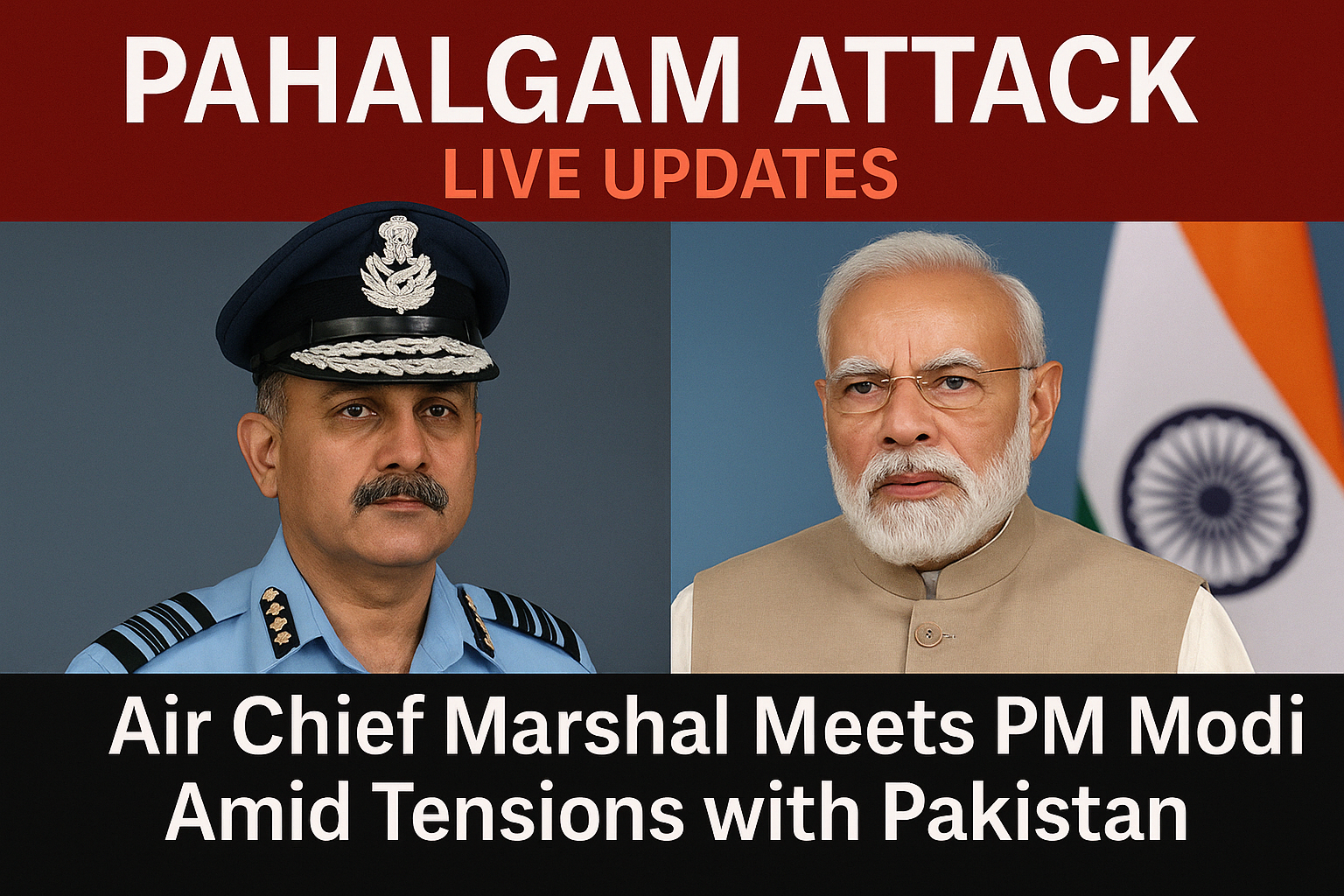
New Delhi | May 4, 2025
Pahalgam Attack: In the wake of a deadly militant strike in Pahalgam, Jammu & Kashmir, India awoke to heightened tensions around its northern borders. As India struggles with new security issues and growing concerns over Pakistan’s involvement, Air Chief Marshal V.R. Chaudhari met with Prime Minister Narendra Modi this morning in a succession of quick developments that fuelled speculation about possible strategic reactions.
What Happened in Pahalgam?
An army convoy travelling through Pahalgam, a charming town renowned more for its natural beauty than its violence, was ambushed late Friday night by a squad of highly armed militants. According to preliminary reports, five Indian Army personnel have died and numerous others have been gravely wounded. One of the bloodiest attacks in the area in recent months, the strike happened close to the Aru Valley road.
Since then, security personnel have surrounded the area and begun a thorough search in an attempt to find the perpetrators. Intelligence sources point to the involvement of foreign-trained infiltrators supported by organisations operating from beyond the Line of Control (LoC), even though no group has yet to claim responsibility.
The Air Chief’s Emergency Meeting with PM Modi
Air Chief Marshal Vivek Ram Chaudhari was spotted early on Saturday morning approaching the Prime Minister’s Office at South Block, which added to the air of urgency. India’s security readiness, the Indian Air Force’s (IAF) operational readiness, and possible escalatory reactions in the event that provocation persists were reportedly the main topics of the private conference.
Pahalgam Attack: The meeting also discussed wider strategic consequences, such as the opening or closing of diplomatic lines with Islamabad, air patrol preparedness, and satellite surveillance updates, according to government sources who spoke on condition of anonymity.
This high-level meeting coincides with mounting demands for a “strong and calibrated” reaction to the attack from defence experts and political leaders.
Pahalgam Attack: India’s Diplomatic Stand and Global Support
Jaishankar, the minister of external affairs, has already contacted his counterparts in the UK, France, and the US. India denounced the “cowardly and premeditated” action and reaffirmed its right to protect national sovereignty in a statement issued by the Ministry of External Affairs.
Powers from around the world have shown support for India. In a statement, the U.S. State Department urged Pakistan to take tough measures against safe havens that operate inside its borders and backed India’s war on terrorism. In a similar vein, the UK condemned the act and encouraged moderation, while France described the incident as a “direct attack on peace in South Asia.”
Tensions with Pakistan Escalate
Although India hasn’t accused Pakistan of planning the attack outright, there are indications that hostility is growing. The already unstable situation has been exacerbated by reports of cross-border shooting in the Tangdhar and Poonch areas.
In a statement, Pakistan’s Foreign Ministry denied any role in the Pahalgam incident and charged India with making “baseless accusations and attempts to divert attention from internal issues.” Indian officials, however, maintain their stance, citing new intelligence that showed increased militant activity near the border.
According to defence specialists, the strike may have been planned to undermine the tenuous peace efforts in the Kashmir Valley because it occurred right before snow melts and infiltration routes open.
Public and Political Reactions
Public indignation has increased throughout India. Using hashtags like #StandWithOurSoldiers and #PahalgamAttack, citizens took to social media to call for justice and a suitable reaction. To honour the slain soldiers, candlelight vigils have already started in a number of cities, including Bengaluru, Delhi, and Mumbai.
Leaders of the opposition also expressed their sympathies, but they urged the government to make sure that political optics do not compromise national security. “We are unified in our opposition to terrorism. Pahalgam Attack the moment has come for responsible and resolute action,” Congress leader Mallikarjun Kharge stated.
What’s Next?
Pahalgam Attack: The next 48 hours will probably be crucial since the prime minister has back-to-back talks with senior military and intelligence personnel. According to reports, the Indian Air Force is on high alert, with radar systems keeping an eye on possible aerial threats and patrols over the Line of Control being stepped up.
Although a full-scale conflict is not being publicly considered, India appears to be ready for a variety of situations, including both covert and overt retaliation, based on its military readiness and diplomatic signalling.
The Pahalgam attack might turn into a major flashpoint in an area already tainted by decades of turmoil. It remains to be seen if it intensifies into a new conflict or if it leads to more international pressure on Pakistan.
The nation is currently watching intently, unified in sorrow yet resolute in its commitment.

[…] Pahalgam Attack: Live Updates as Air Chief Marshal Meets PM Modi Amid Heightened Tensions with Paki… […]